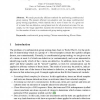Free Online Productivity Tools
i2Speak
i2Symbol
i2OCR
iTex2Img
iWeb2Print
iWeb2Shot
i2Type
iPdf2Split
iPdf2Merge
i2Bopomofo
i2Arabic
i2Style
i2Image
i2PDF
iLatex2Rtf
Sci2ools
111
click to vote
WADS
2005
Springer
2005
Springer
Improved Combinatorial Group Testing for Real-World Problem Sizes
We study practically efficient methods for performing combinatorial group testing. We present efficient non-adaptive and two-stage combinatorial group testing algorithms, which identify the at most d items out of a given set of n items that are defective, using fewer tests for all practical set sizes. For example, our two-stage algorithm matches the information theoretic lower bound for the number of tests in a combinatorial group testing regimen.
Algorithms | Combinatorial Group Testing | Group Testing Regimen | Two-stage Combinatorial Group | WADS 2005 |
Related Content
| Added | 28 Jun 2010 |
| Updated | 28 Jun 2010 |
| Type | Conference |
| Year | 2005 |
| Where | WADS |
| Authors | David Eppstein, Michael T. Goodrich, Daniel S. Hirschberg |
Comments (0)

